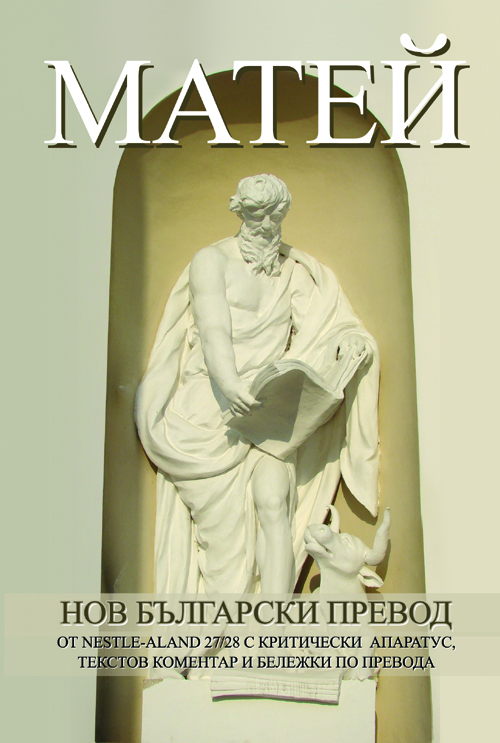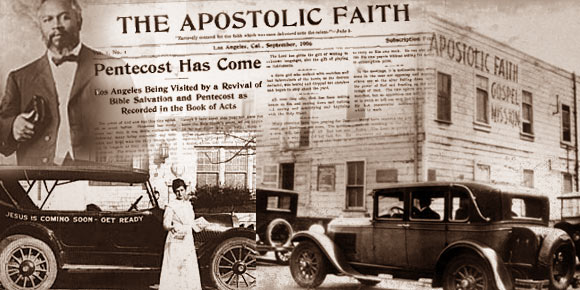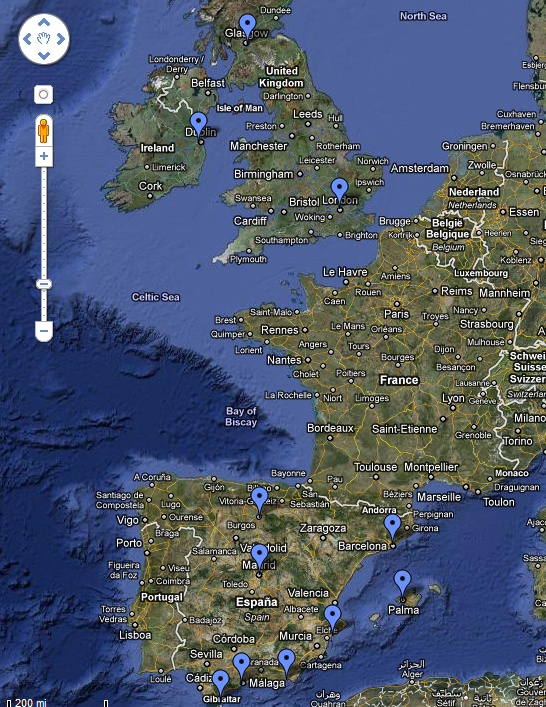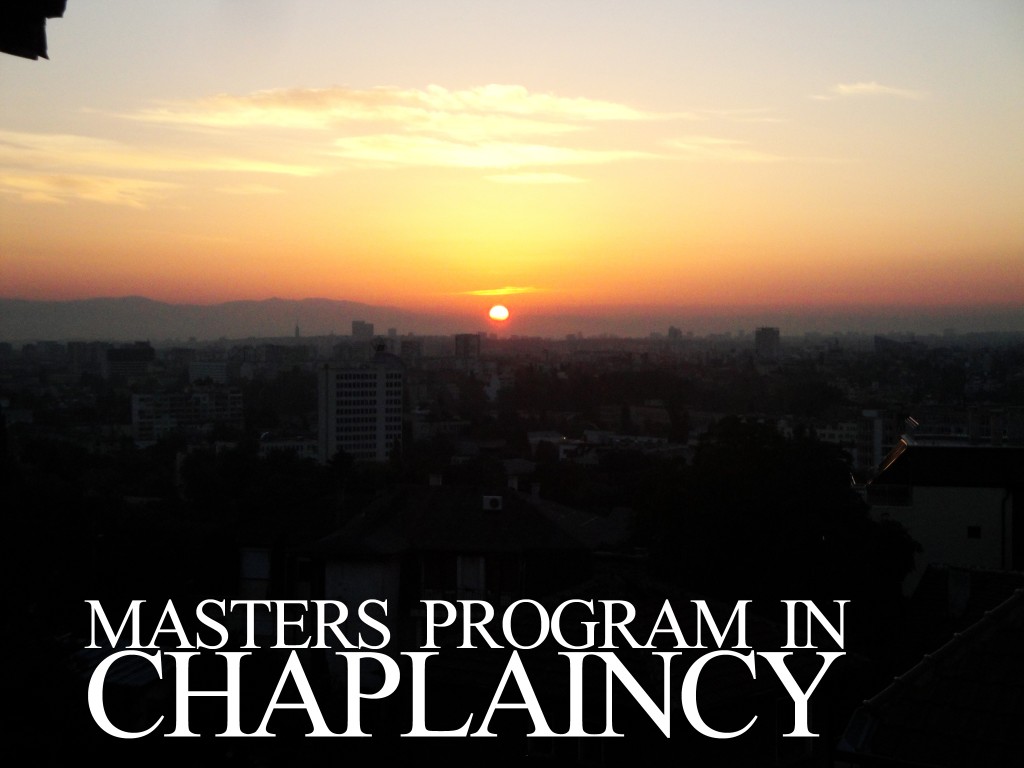Gospel of Matthew Released for Christmas
 True Reformation does not start with preaching or theology, although they are both fundamental stones of every process that changes the people of the church. But in order for this to occur, both preaching and theology need a text; and not merely any text, but Divinely Inspired Scriptures – the Holy Bible.
True Reformation does not start with preaching or theology, although they are both fundamental stones of every process that changes the people of the church. But in order for this to occur, both preaching and theology need a text; and not merely any text, but Divinely Inspired Scriptures – the Holy Bible.
In our humble ministry efforts, we have attempted to provide this text in the form of a new Bulgarian literal translation made from the Nestle-Aland critical edition of the New Testament. The initial work started in 1996 with brief interruptions until 2003 when the framework was completed and the project was successfully launched.
In 2007, we set course with a pilot edition of the new translation including the Gospel of John, which was printed for Christmas. Our team continued with a full edition of the Johannine works, which included The Gospel of John, Epistles and Apocalypse, published for Easter 2008. In 2009, we presented a partial methodology behind the translation at the Logos Software’s annual BibleTech conference in Seattle and at the 2010 BibleTech in San Jose, our team was able to show in an actual work setting the software used to prepare the Bulgarian interlinear text to the Nestle-Aland critical edition of the New Testament. Finally, we were able to publish in print the complete translation of the Gospel of Matthew for Christmas 2010. The printing of Mark and the Lukan Corpus are scheduled respectively for Easter and Christmas of 2011.
Other related project by Cup & Cross Ministries International:
JOHN: Gospel, Epistles and the Apocalypse (New Bulgarian Translation) released for Easter, 2008
OurCOG.org | WorldMissions.TV | ProBible.Net | Bibliata.com | Bibliata.TV
Bulgarian Churches in Western Europe
Bulgarian Churches in Spain
View UntitledBulgarian Churches in Spain in a larger map
I Shall Wear a Robe and a Crown
I Shall Wear a Robe and a Crown (MP3)
Bulgarian Churches in the United Kingdom
View Bulgarian Churches in the United Kingdom in a larger map
Bulgarian Churches in Cyprus
View Bulgarian Churches in Cyprus in a larger map
Happy Thanksgiving
Whereas it is the duty of all nations to acknowledge the providence of Almighty God, to obey His will, to be grateful for His benefits, and humbly to implore His protection and favor; and Whereas both Houses of Congress have, by their joint committee, requested me to”recommend to the people of the United States a day of public thanksgiving and prayer, to be observed by acknowledging with grateful hearts the many and signal favors of Almighty God, especially by affording them an opportunity peaceably to establish a form of government for their safety and happiness:”
Now, therefore, I do recommend and assign Thursday, the 26th day of November next, to be devoted by the people of these States to the service of that great and glorious Being who is the beneficent author of all the good that was, that is, or that will be; that we may then all unite in rendering unto Him our sincere and humble thanks for His kind care and protection of the people of this country previous to their becoming a nation; for the signal and manifold mercies and the favorable interpositions of His providence in the course and conclusion of the late war; for the great degree of tranquility, union, and plenty which we have since enjoyed; for the peaceable and rational manner in which we have been enable to establish constitutions of government for our safety and happiness, and particularly the national one now lately instituted for the civil and religious liberty with which we are blessed, and the means we have of acquiring and diffusing useful knowledge; and, in general, for all the great and various favors which He has been pleased to confer upon us.
And also that we may then unite in most humbly offering our prayers and supplications to the great Lord and Ruler of Nations and beseech Him to pardon our national and other transgressions; to enable us all, whether in public or private stations, to perform our several and relative duties properly and punctually; to render our National Government a blessing to all the people by constantly being a Government of wise, just, and constitutional laws, discreetly and faithfully executed and obeyed; to protect and guide all sovereigns and nations (especially such as have shown kindness to us), and to bless them with good governments, peace, and concord; to promote the knowledge and practice of true religion and virtue, and the increase of science among them and us; and, generally to grant unto all mankind such a degree of temporal prosperity as He alone knows to be best.
Given under my hand, at the city of New York, the 3d day of October, A.D. 1789. -George Washington
Masters of Chaplaincy Continues in Bulgaria
The Masters Program in Chaplaincy Ministry is continuing at the Bulgarian Evangelical Theological Institute under the patronage of the Bulgarian Chaplaincy Association. It purposes to prepare chaplains in all professional areas as military, prisons, hospitals, and so forth. as it draws theological students with baccalaureate and masters degrees in their respective fields.
After successfully finishing the first module in chaplaincy in September, the students are now engaged with the second module of theological studies. All courses are taught by graduate professors from Bulgaria and the United States, at the Institute’s extension in the town of Yambol, where Cup & Cross Ministries’ headquarters are also located.
The current theological module includes the following courses:
1. Introduction to the Old Testament
2. Introduction to the New Testament
3. Church History
4. Systematic Theology
5. Religious Pluralism
6. Cults and Religions
7. Homiletic
8. Hermeneutics
The ProBible Project Released
 Cup & Cross Ministries’ web research team has just released a new internet Bible study project called ProBible.Net. ProBible integrates an extensive Biblical Greek knowledge database of the scholarly b-Greek mailing list. The new website archives in real-time panel discussions led by Greek scholars, university professors and Bible researchers and places them as commentaries to their respective Bible passages. The result is a new kind of integrative online research, which has the original languages of the Bible text discussed in dept by scholars and experts in the field. The best part is that all users can participate in the online discussions via the website or the b-Greek list. The hope of the developing team is to create a fully annotated online study Bible, which includes a commentary to all important parts of Scripture.
Cup & Cross Ministries’ web research team has just released a new internet Bible study project called ProBible.Net. ProBible integrates an extensive Biblical Greek knowledge database of the scholarly b-Greek mailing list. The new website archives in real-time panel discussions led by Greek scholars, university professors and Bible researchers and places them as commentaries to their respective Bible passages. The result is a new kind of integrative online research, which has the original languages of the Bible text discussed in dept by scholars and experts in the field. The best part is that all users can participate in the online discussions via the website or the b-Greek list. The hope of the developing team is to create a fully annotated online study Bible, which includes a commentary to all important parts of Scripture.
Tag: http://ProBible.net
Azusa Street’s Apostolic Faith Renewed
 Cup & Cross Ministries International is renewing the publication of the Apostolic Faith newspaper archive, which recorded the events of the great Pentecostal revival of Azusa Street.
Cup & Cross Ministries International is renewing the publication of the Apostolic Faith newspaper archive, which recorded the events of the great Pentecostal revival of Azusa Street.
In September 1906, the Azusa Street Mission began publishing a newspaper, The Apostolic Faith. The paper contained news, testimonies, and sermons by Seymour and others. The Apostolic Faith was the instrument God used to spread the Pentecostal message around the world. At its height, the newspaper had a circulation of 50,000.
Clara Lum was a stenographer who recorded many of the events of the meetings and contributed to the paper. She was a member of the original credentialing committee at Azusa Street. Glenn A. Cook also had previous newspaper experience and helped with The Apostolic Faith.
The newspaper also became a matter of great controversy. Clara Lum and Florence Crawford left the mission to start a work in Portland, Oregon. They began publishing The Apostolic Faith from their new home. It is believed by many that, without permission, they took the mailing lists from the mission. This essentially crippled the mission in its contact with the world and ability to raise funds and contributed to the end of the revival.
The entire story of the split between Seymour and Crawford will probably never be known. Crawford and Lum have many defenders. This much is certainly clear from the historical evidence, there was a definite rift between the work in Los Angeles and the one in Portland.










